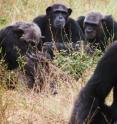Apes get emotional over games of chance
Like some humans, chimpanzees and bonobos exhibit emotional responses to outcomes of their decisions by pouting or throwing angry tantrums when a risk-taking strategy fails to pay off, according to research published May 29 in the open access journal PLOS ONE by Alexandra Rosati from Yale University and Brian Hare from Duke University. The researchers assessed the emotional responses and motivation of chimpanzees and bonobos living in African sanctuaries. Rosati explains, "Psychologists and economists have found that emotions play a critical role in shaping how humans make complex decisions, such as decisions about saving or investing money. But it was not known if these processes are shared with other animals when they make decisions about their important resources--such as food."
The apes in this study faced two different types of problems: one where they made choices about whether to wait to obtain larger rewards, and one where they made choices about whether to take a chance to obtain a high-quality treat, but risk obtaining a non-preferred food item if their gamble did not pay off. The scientists found that both species displayed emotional responses to the outcome of their choice, but chimpanzees were more patient and likely to take risks than bonobos. When their choice yielded the less preferred outcome, both species displayed negative emotional responses including vocalizations similar to pouts and moans, scratching, and banging--a type of tantrum thought to reflect anger in apes. In the risky choice task, the apes even tried to switch their choice after the fact when they realized they had made a losing gamble, but never did so when their risk-taking paid off. Some of the emotional and motivational responses displayed by the apes were species-specific while others reflected individual differences in the animals.
Based on their results, the authors conclude that apes do exhibit emotional responses to decision-making, like humans. They add that further research is needed to determine whether these emotional responses to outcomes can change the apes' future choices and decisions.
Source: Public Library of Science
Other sources
- VIDEO: Bad choices make apes 'throw tantrums'from BBC News: Science & NatureThu, 30 May 2013, 10:30:40 UTC
- Apes get emotional over games of chancefrom Science DailyThu, 30 May 2013, 6:30:23 UTC
- Apes are emotional about choicesfrom BBC News: Science & NatureThu, 30 May 2013, 2:30:33 UTC
- Bonobo Makes An Emotional Choice | Videofrom Live ScienceWed, 29 May 2013, 21:40:13 UTC
- Apes get emotional over games of chancefrom PhysorgWed, 29 May 2013, 21:10:20 UTC

